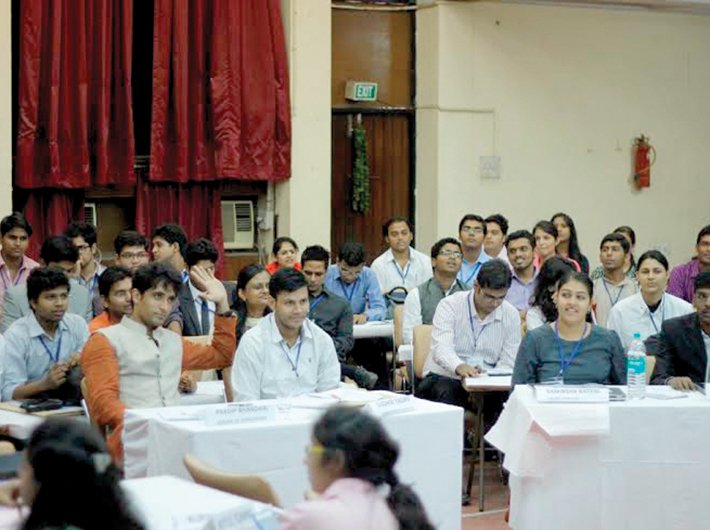The application process began in July and about 150 students were selected to take part in MY Parliament
It was early last year when a young entrepreneur and an activist had their eureka moment. Both public policy enthusiasts, Raghav Garg and Supriya Sharma were tossing, debating and ideating on how to make the youth more involved in public policy initiatives – certainly not a subject the average teen is attracted to automatically – when they came up with the idea of MY Parliament – or Model Youth Parliament. Little did they know, however, that their ‘idea’ would shape up in such a way that students across the country would become a part of the programme – within a year and a half.
Their dream achieved fruition on September 27-28, when nearly 250 students from Mizoram, Chennai, Ahmedabad, etc., representing 150 constituencies, took part in the first MY Parliament held in the national capital.
Garg, a law graduate and masters in management from London Business School, has a background of working with NGOs for 10 years during his student days. He is the founder of DIA Initiative, part of the policy awareness programme of MY Parliament.
Sharma, a graduate from BITS Pilani’s Goa campus and working in the development sector for the past three years, had also founded an organisation called UDAAN for overall development and empowerment of housekeeping staff. Sharma, who calls herself a public policy enthusiast, has no hesitation in saying that the “concept” of MY Parliament came from Garg. “We had been contemplating doing something about making the youth more aware about the policy-making process,” she said. Once the idea was formalised, “I decided to take it up fulltime”.
While the concept is not unique and many schools already have such forums, Sharma said, “We wanted to do it on a national scale.” She stressed the fact that issues of national importance were “closer to our hearts and there should be a platform where students could discuss policies, their implementation and flaws”. “Why should the process of policy-making be restricted to bureaucrats and politicians? All of us discuss policies within closed doors, but why isn’t there a platform for representation of our ideas?”
After fine-tuning the idea by May , they conducted policy workshops at IIT-Delhi. The workshop was open for all. “Initially, we didn’t have any funds but we somehow managed,” she said.
Ruing that “there is no direct engagement of the government with people”, Sharma said, “During college days, when I was working for UDAAN, I realised that people are not interested in parliament. They didn’t understand how it functioned. Voting is not the end – if we want to witness change, we have to work towards it.”
The application process began in July. “There were about a thousand applicants, of which we selected 150 students.” Those who wanted to participate in the debate as cabinet ministers, prime minister and leader of opposition had to fill in separate forms. “We also sent reading material to the selected students,” she said.
On September 27, Harsh Mander, special commissioner to supreme court in the right to food cases, and Aam Aadmi Party leader Manish Sisodia conducted the legislative proceedings after which the ‘house’ passed Lokpal and lokayukta bill, food security bill and protection of women against sexual harassment at workplace along with FDI in multi-brand retail. The lokpal bill was passed after consideration and clause-by-clause analysis. Also, a consensus was reached on ensuring nutritional security than just food security for the country.
Garg said, “We elect parliamentarians, so it is our responsibility to vote for the right person. My Parliament will try to make students aware of policy-making processes among many other things.” A hopeful Sharma said their aim was to have student representatives for all the 543 constituencies next year. “That’s our vision,” she said.
(The story appeared in magazine Volume 05, Issue 18, October 16-31, 2014 issue)
Governance Now was media partner for the event.

